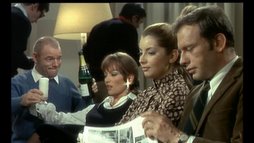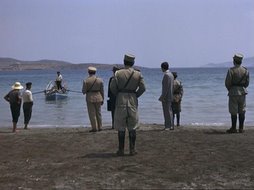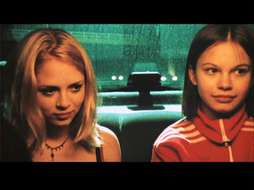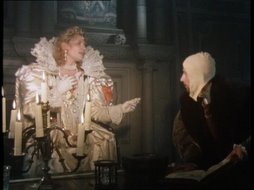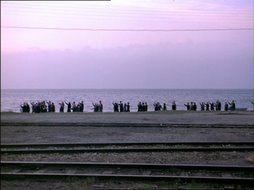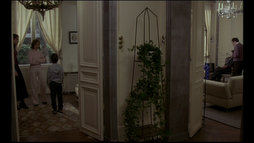
The Judgement Of Solomon: I Kings iii 16-28
Then came there two women, that were harlots, unto the king, and stood before him.
And the one woman said, O my lord, I and this woman dwell in one house; and I was delivered of a child with her in the house. And it came to pass the third day after that I was delivered, that this woman was delivered also: and we were together; there was no stranger with us in the house, save we two in the house. And this woman's child died in the night; because she overlaid it. And she arose at midnight, and took my son from beside me, while thine handmaid slept, and laid it in her bosom, and laid her dead child in my bosom. And when I rose in the morning to give my child suck, behold, it was dead: but when I had considered it in the morning, behold, it was not my son, which I did bear.
And the other woman said, Nay; but the living is my son, and the dead is thy son.
And this said, No; but the dead is thy son, and, the living is my son.
Thus they spake before the king.
Then said the king, The one saith, This is my son that liveth, and thy son is the dead and the other saith, Nay; but thy son is the dead, and my son is the living. And the king said, Bring me a sword.
And they brought a sword before the king.
And the king said, Divide the living child in two, and give half to the one, and half to the other.
Then spake the woman whose the living child was unto the king, for her bowels yearned upon her son, and she said, O my lord, give her the living child, and in no wise slay it.
But the other said, Let it be neither mine nor thine, but divide it.
Then the king answered and said, Give her the living child, and in no wise slay it she is the mother thereof.
And all Israel heard of the judgment which the king had judged; and they feared the king: for they saw that the wisdom of God was in him, to do judgement.
Antonio Machado: Is this the house where we cut innocents' throats?
No, here we just cut throats.
The Film:

Ruiz's Comedy Of Innocence, based upon Massimo Bontempelli's novella Il Figlio Di Due Madri, quickly emerges as a riddle, wrapped in an enigma shrouded in mystery. What at first seems to be a fairly straight forward tale of mistaken identity soon becomes something far more dense, far more perceptive and - far more interesting. As the director has stated, the film's narrative and the events within that narrative have an explanation but that explanation doesn't actually explain anything. Throwing the audience's perceptions of reality is one thing, but to do so in quite the controlled manner demonstrated here by Ruiz really is something quite extraordinary indeed. So, where to start with analysing such a superb piece of film making?

The story revolves around a comfortable bourgeois Parisian family, played by Isabelle Huppert, Charles Berling, Denis Podalydès and Nils Hugon - plus the nanny (Laure de Clermont-Tonnerre). This family enjoy their life surrounded by [mainly artistic] luxuries, Huppert is a theatrical designer who paints in her spare time and Podalydès is a businessman who spends a lot of his time travelling leaving his medical brother, Serge (Charles Berling) to look out for his family. Everything is going as per usual whe one day the young boy, Camille, starts behaving strangely. Strange behavious is not unusual for a 10 year old boy but Camille then claims that's not his name before taking his mother to a house in a part of Paris he's never visited before, claiming it to be his "real home" - then, we meet Isabella (Jeanne Balibar) who the boy claims is his real mother. Ariane (Huppert) invites Isabella to stay in their house while she figures out what is wrong with her son, hoping perhaps that medically-trained professional Serge might be able to cure whatever it is that is happening to him. During this time Camille has decided his name is in fact Paul - the name of Isabella's deceased son who also happened to be born on the same day as Camille, which raises the question for all involved, "Is Camille really Paul?". In the end a resolution of sorts, is reached although it still leaves many questions unanswered (almost certainly Ruiz's intention).

Perhaps the most interesting aspect of the film, is that it can be conceived of as a ghost story with no ghosts. Be it for Gallic traditional reasons, economic reasons or otherwise it is noted by the director on the Region 2 dvd that the French don't tend to make ghost films like some other countries do/have done. Camille has a friend, Alexandre, who may be imaginary, may be a ghost, or may actually exist in real life. Likewise, when we find out about the accident that supposedly killed Paul, there is enough left unsaid to suggest that there's a possibility that Camille could be Paul, in which case he would in effect be a living ghost - a boy who died but who is alive. The comfortable, expansive, bourgeois Parisian house in which most of the film takes place itself becomes a character in the film. Beyond the strange sounds there is a creepy, disturbing over-abundance of busts filling the mantelpieces and shelves of the interior, more than that however, as the film progresses the statues move to face in different directions.

It's easily missed at first but on watching the film again it's quite noticeable that between scenes they move to look towards people or objects in the house - the most obvious example of which is when one of the paintings hanging in the house inexplicably changes from a portrait to The Judgement Of Solomon; suddenly the statues in the room are all looking at the painting. There are other little things too - the way the camera pre-empts the movements of the characters as if the house knows what they are going to do, and then there are the strange sounds, sounds that don't match what is actually happening on-screen the most common of which is the rushing of water we hear when there is no water around.

Water, the ebb and flow of which, seems to form one of the central themes of the film. Be it the bizarre blue colours that afflicts some of the abstract images Camille films on his camera, or simply the way he holds his camera above the dinner table like a periscope rising from a submarine there is water running through this film. In one rather shocking scene the image itself warps and goes a blue tint as Camille invites his uncle to "come into the deep water" with him. It turns out there are quite literal reasons for this aquatic feel - the boy Paul drowned when he fell from a barge on The Seine, but beyond this water has always had connotations of femininity (see Polanski's Knife in The Water for some not-so-subtle sexual symbolism involving water) and this is a film that very much deals with concepts of femininity and womanhood.

The film is filled with shots of flowing water that both mirror the fluid nature of the plot's development and suggest or hint at the emotional turbulence that could come. One angle of the film is that maternity, or the maternal instinct at least is as dangerous when array as any other force in nature, likewise water can be safe but with certain currents and eddies people can quickly find themselves impossibly submerged without oxygen; it's easy to quickly lose your bearings underwater. All of these notions come to the fore towards the film's climax with an emotionally shattered, desperate Isabelle Huppert sat in her garden on a chair with Camille/Paul running around her with his camera: all we can hear is the sound of rushing water.

I think it is the maternal elements of the film, and the other human relationships within it that form the crux of the masterpiece. On the face of it you could look at the film and see that the boy is lonely, that his rich mother (Huppert) doesn't love him, that the nanny who is always hovering in the background is more of a mother to him than his real one and that his 'new' mother gives him the love and affection he has craved for so long. Life isn't that simple though, and nor is the film. The nanny is having an affair with Serge (the boy's uncle), when Isabella arrives on the scene it's not too long before she too tries to seduce Serge - is this trying to suggest the two women are very similar? Certainly the nanny seems to resent Isabella's presence as it seems to impede her own maternal instincts; the nanny always carries a doll of a little girl around with her - again suggesting maternal issues relating to childhood.

Indeed, a psychologist could watch the film and see the father abandoning his child to go on business, but with Serge fulfilling the father-figure role for the majority of the film that doesn't quite explain what's happening or why. Serge himself is interesting because while he's clearly an adult, he gets very angry when he sees Camille playing with his toy cars - he doesn't quite throw a childish tantrum but you can see one brewing in his eyes. Having said [above] that Huppert's character doesn't love her son enough that patently isn't true - her hurt both physically and emotionally as her child rejects her is palpable; few actors can do torment like Isabelle Huppert and in the film even she really excels herself. Does perhaps the boy Camille feel he's been abandoned by his parents, maybe because he spends all his time with the nanny and his father usually only talks when telling him off? It's unlikely as we see they do spend a reasonable amount of time together as a family and get on with each other as well as any family unit can be expected to.

It's this that really makes the film so brilliant in my mind - at first it's straight forward but the more you try to unravel the plot and the inter-relationships of the characters the more unfathomable it becomes. The way that Ruiz has thought through every aspect of the film-making process from the editing (there's a noticeable absence of shot/reverse shot cutting) to the sound (water, sound of footsteps etc) to the way each shot is framed beautifully with luxurious tracking and panning movements is simply a feast for any cinephile to behold, and it's all capped off with some incredible performances and, her, i ave to say the crème de la crème is Jeanne Balibar as the invasive but seemingly innocent Isabella. A uniquely fantastic film, instantly rewatchable.
9/10




